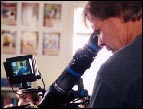EVANGELISM
Christians
Making an Impact in Hollywood, Part Two
By
Craig von Buseck
CBN.com Producer
CBN.com
-- The new film, Hometown Legend, from Jenkins Entertainment
opens in theaters in Louisville, Nashville, St. Paul/Minneapolis,
and Colorado Springs in April. Jenkins Entertainment has signed
a distribution deal with Warner Brothers, and they will release
the movie to video/DVD in August, 2002.
CBN.com Producer, Craig von Buseck, recently sat down Dallas
Jenkins, the producer of the film, James Anderson, the director,
and Jars of Clay's Dan Haseltine, who composed the movie's sound
track. They talked about the making of this movie -- and the impact
that Christians are having in Hollywood today.
Craig von Buseck: I agree that Christians should be out
in the forefront making the best stuff. But many times the people
who own the studios and the distribution don't want to put out
a film with a Christian worldview.
 Dan
Haseltine: I would disagree, because the world loves redemption.
The world loves forgiveness. The world has a very soft place in
their heart for stories that have a happy ending. Dan
Haseltine: I would disagree, because the world loves redemption.
The world loves forgiveness. The world has a very soft place in
their heart for stories that have a happy ending.
James Anderson: I think the problem is that when people
set out to make a "Christian" film, they've got to get the whole
thing, lock, stock, and two smoking barrels. It doesn't happen
that way anywhere else but Christianity. I think many groups have
found a very solid niche in society because they don't hammer
you with the full weight of things. Gay and lesbian issues have
found their way into popular culture because they make them seem
like they're just the guy next door. They don't hit you with the
full weight of what's happening there. You see films that promote
Buddhist issues, or other cultural things, and they don't hit
you with the full thing. How they get you is with their lowest
common denominator. Well, our lowest common denominator is widely
accepted principles of love and forgiveness.
The things that Dallas and I have talked about specifically,
wanting to improve the culture's view of marriage, having a whole
family, how do you deal with love, how do you deal with sex --
and those kinds of issues are very different from what the world
wants to be a part of. But we've actually had a very positive
response from the secular media to this film because they see
that it has so much heart. It's so wholesome, it makes you feel
good.
Dallas Jenkins: If they feel like you're using them as
a means to your own propaganda, they'll say no, because they don't
do that for anybody. But if they feel like you're just making
a good quality film that's O.K.
Another big point is, Hollywood isn't run by some board of directors
who has a list that they allow into the gates. Hollywood is just
as open a market as any other business. So one of the things that
I always say to Christians who want to get into the industry is,
you don't have to buzz at the gate to get in. This is an open
market. Do your own. It's not like you don't have the same access
to theaters, and the same access to distribution that everyone
else has. A lot of it we're controlling ourselves.
Craig von Buseck: So how did you do that? How did you
say, wow, this a great script -- it's got a good, positive message,
but it's not so "in your face" that people are not going to get
behind it who have the money? How did you take that step?
Dallas Jenkins: Well, we put up the money ourselves. We
didn't ask for any favors. No on is going to necessarily make
things easy for you. We got good actors, a good director, and
a good composer, people who were already respected in the industry.
And we made a good film, and worked hard, and people in the industry
respect that.
We've had the attitude that we're not going to wait for people
to do things for us. We're not going to try to always play by
someone else's rules. Because we did that I think that we actually
got more respect. If you want to have things done for you, you
have to make a great movie. You've got to have the same standards
they do, and you have to work just as hard as they do.
James Anderson: And Dallas maintained control, and by
doing that he was able to insure that the integrity of the project
as we first saw it. It would not be compromised by somebody saying,
"This is nice, but instead of saying 'dear Lord, we need a miracle'
could she just say, 'we need a miracle,' because that will play
better." There's nobody saying that because Dallas and his dad
kept control and then we can say whatever we want, and nobody's
bothered by it. But it's those people that are the gatekeepers
that are going to be saying, "You shouldn't say dear Lord."
Dallas Jenkins: I hope that eventually some more of the
Christians become the gatekeepers. I hope that some Christian
will run a studio, and will be willing to put up the time, and
the effort, and the money. There's money there, and there are
hard workers there.
 Craig
von Buseck: And there is obviously a market there. There are
people who are looking for this kind of product on the consumer
end. Craig
von Buseck: And there is obviously a market there. There are
people who are looking for this kind of product on the consumer
end.
Dallas Jenkins: And that is what you are doing at CBN.
You're not trying to make programs so that CBS will buy them.
You started your own network, and you do it high quality. You
start your own web site, and you make that high quality. If you
were trying to break into the doors of network television, then
you are beholden to what they want, and so you're doing it yourself.
Craig von Buseck: Dan, did you write from the script,
or did you wait to see the rushes and wrote the music from the
rushes?
Dan Haseltine: A little of both. I actually started writing
themes before I actually got the script.
Dallas Jenkins: That's because he has another job on the
side (laughs).
Dan Haseltine: Yeah, I've got this other day job (laughs).
So it was a process of getting scenes from them and then writing
to those, a talking to them and asking, what's the scene about,
and what do you really want to get out of this? I'd ask, what
kind of emotions are we trying to get out of different scenes.
This is the first film that I've ever done music for, so I went
out and bought a bunch of books on film scoring.
Dallas Jenkins: Composing for Dummies (laughs).
Dan Haseltine: It's amazing, because you go through all
these books, and there are all these rules. And you go through
and you try to find the foundation of what really needs to happen
when you do a film. At the end of every book, after you've gone
through all the rules and regulations, and things you should and
shouldn't do, there is always the one sentence that disqualifies
all of that and says, "now you know the rules, remember, it's
all about feeling."
Dallas Jenkins: We have all these ideas of how the film
is going to turn out, and what it's going to look like, and what
the music is going to be. And then the rushes come in, and then
you edit the film, and you remember it's not about basketball,
it's about football, and then that changes -- and so I know that
Dan's music changed through the process. There were a couple of
times when he would come up with a score for a scene and it would
almost teach us how the scene should play out. So it was very
collaborative.
Dan Haseltine: That's the best part of the creative process,
is when the project you're working on starts to take on a life,
and starts showing you what it's supposed to be. It starts defining
itself. That's the best part, because then Dallas doesn't have
to worry being in control as much as being able to be in awe of
what's going on in the project. He can say, 'wow, I can step back
and realize that this thing is growing, it's taking on a life.'
It's an exciting process.
Craig von Buseck: Let's talk about learning. What was
the life lesson that came out of this process for you?
Dallas Jenkins: Don't get into the movie business unless
you're prepared to get kicked around a bit.
Dan Haseltine: Don't do films in hot weather during the
summer (laughs).
 James
Anderson: For me, there was a point right after Christmas
in which we had pretty much edited the film down as close to what
it was actually going to be. We kind of knew what it was going
to be. And there was a point when you're kind of faced with what's
really there. And I was really frustrated by what was there --
you know, why didn't my ideas come through, and I had that great
plan, and how did I lose track of this. I was in a really deep
depression about where the movie actually stood. James
Anderson: For me, there was a point right after Christmas
in which we had pretty much edited the film down as close to what
it was actually going to be. We kind of knew what it was going
to be. And there was a point when you're kind of faced with what's
really there. And I was really frustrated by what was there --
you know, why didn't my ideas come through, and I had that great
plan, and how did I lose track of this. I was in a really deep
depression about where the movie actually stood.
I kept saying to my wife, this is not going to be a successful
film. She asked me at one point, "How are you going to define
when it's a successful film?" Through the course of a few days
I started going over what that would be -- it gets a theatrical
release, or makes a lot of money, or it sets benchmarks. What
if it won an Academy Award? At that point would I consider it
successful? I had to say no for all of those things. However realistic
or unrealistic those things would be, that would not be the benchmark
of a successful film for me. I began to realize that what Dallas
and I set out to do was to change the way that people make movies.
When they tell us we can't, let's do it. And when they tell us
we shouldn't, let's definitely do it. And when trouble happens,
let's remind people that we're not alone.
Probably the best feeling I have about this film is that I know
in my heart that we impacted some of the most grizzled non-Christian
out there. We made a positive impact for the kingdom of Christ
by exposing them to people who were real, and creative, and fun.
Dallas Jenkins: But that in turn freed us up creatively,
and we were able to focus better. And we ended up with a good
product. And it's important to know that he did come out of the
depression!
James Anderson: Yes!
Craig von Buseck: That's why you're wearing black, right
(laughs)?
Dan Haseltine: He's mourning the loss of his depression
(laughs).
James Anderson: I think that a reassessment of my original
goals of what the benchmark was of a successful venture here,
and realizing that it was about positively impacting people for
the kingdom of God.
Craig von Buseck: So how do you feel about the film now
that it's being released?
James Anderson: I think we have a lot to really be proud
of. I also think we have a lot left in the tank. This is not my
opus; it's not Dallas' opus, or Dan's opus -- this is just the
beginning.
Dallas Jenkins: But it's a good beginning. The biggest
benchmark for us was the response it got from the gatekeepers
in Hollywood. It was extremely positive. Ninety percent of independent
films never see the light of day. I'm not exaggerating. If they
get anything it shows up at 3 o'clock in the morning in some cable
station. This movie is going to be in theaters, and it's going
to be on video. It's a good film, and people have enjoyed it,
and have been moved by it.
James Anderson: We have people from our crew and from
our cast that are still desiring to be around us because they're
realizing that they had something different and something special.
I feel like we've already made a successful film. We've really
set up something strong because we can take everything we've learned
and apply it to the next one, and we should be able to fly twice
as high.
Dallas Jenkins: This is a film that Christians will be
able to see and be proud of, and will be able to take their friends
to see. In addition it will be in Blockbusters and Wal-Mart. Christian
bookstores will be able to carry it and say, this is not only
a good film, but it's one that has a good message. That was important
for us as well. All three of us grew in a Christian culture and
were in youth groups. And your youth group pastor was always renting
Christian films
Dan Haseltine: like Erik Estrada in Cross and the Switchblade
(laughs).
Dallas Jenkins: Or there weren't any real Christian movies,
or movies that you could watch at a youth group event. Either
the mainstream movies were bad to watch
Craig von Buseck: Someone had to stand in front of the
screen while you fast forward through the bad part (laughs).
Dallas Jenkins: Exactly -- this is the scene where he
says a bad word, so we have to fast forward (laughs). Or it was
just not a good film. So this is a film that we think is a great
bridge between Christians and non-Christians. But it's very important
that we also want to let people know that we're not necessarily
Christians trying to come in through the back door of Hollywood.
We are Hollywood. We are part of Hollywood, just like a Christian
plumber is part of the plumbing industry. It's not us verses them
-- we are them. But we're a positive impact there, so something
good is coming out of Hollywood now.
Dan Haseltine: We're in the army, and we're recruiting
a force of people who want to change the way Hollywood views a
great many things. And we're doing that inside out.
Craig von Buseck: Doesn't it seem that there is somewhat
of a trend in this direction overall? It seems that in the last
couple of years there have been more positive message films. You
look at The Prince of Egypt, and how that signaled a shift.
Dallas Jenkins: The difference between now and ten years
ago is a seismic shift. There are both Christian companies doing
more films, and there are more studios doing positive-oriented
films because they're finding out that there's an audience. We're
not there yet, it's moving slowly, but we're getting there.
If we have delivered a movie that you will enjoy, please support
it and get people to come so that we can make more of them. But
if we don't then we deserve the same criticism that everyone else
does -- don't hold us to a different standard. Pray for us, and
for people who make movies, because it is the most influential
medium in the world.
Related articles:
Christians
Making an Impact in Hollywood, Part One
More from Craig von
Buseck on CBN.com
Order
your copy of Jerry Jenkin's companion novel, Hometown Legend
Check
out Jenkins Entertainment Online
More
evangelism on the Spiritual Life Channel
CBN IS HERE FOR YOU!
Are you seeking answers in life? Are you hurting?
Are you facing a difficult situation?
A caring friend will be there to pray with you in your time of need.
|